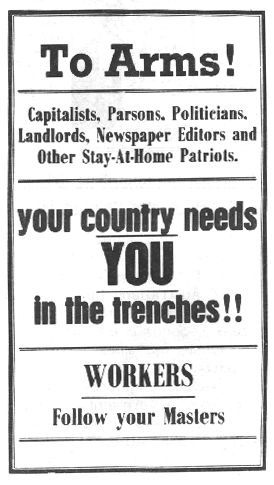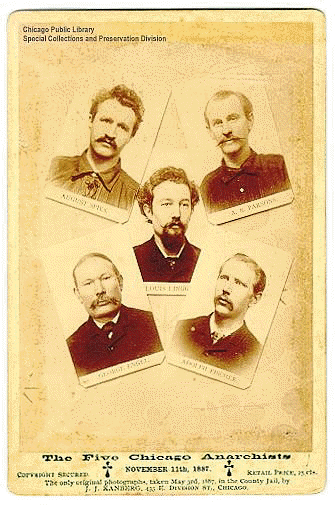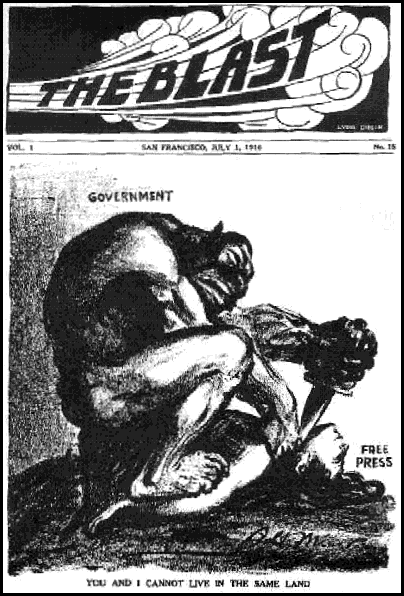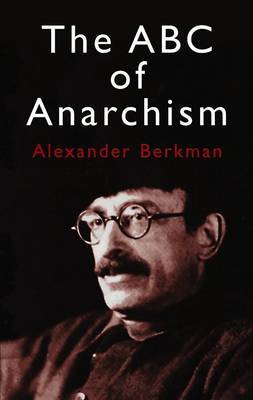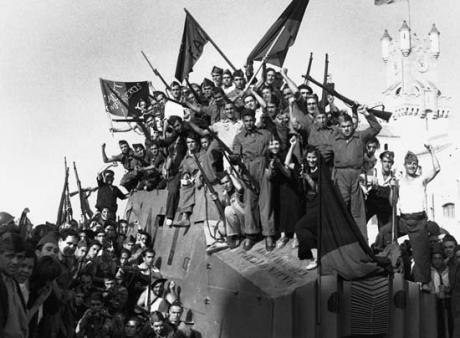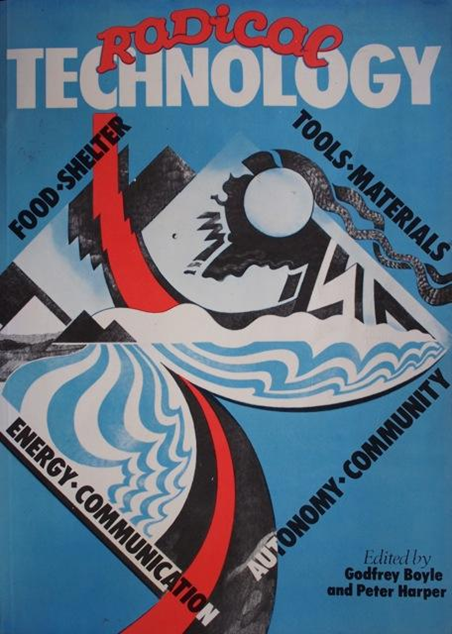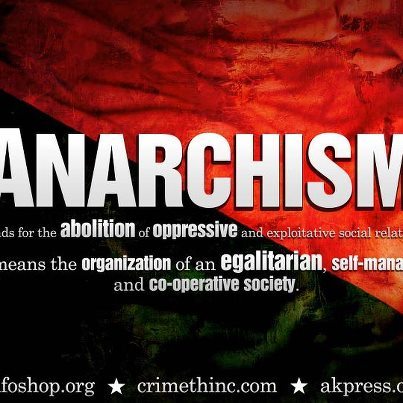As we approach yet another anniversary, the Bolshevik dictatorship’s suppression of the revolt by the Krondstadt naval garrison in March 1921, I thought it was an opportune time to reprint excerpts from Emma Goldman’s classic rejoinder to Leon Trotsky’s shabby justifications for the Bolsheviks’ repressive actions. Written in 1938, “Trotsky Protests Too Much” is classic Goldman. She takes to task both Trotsky and one of his apologists, John G. Wright, for their ongoing attempts to defend Trotsky’s (and the Bolshevik regime’s) violent attack on the Krondstadt sailors, and their abject failure to acknowledge the role these actions played in paving the way for Stalin’s dictatorship. I included excerpts from Emma Goldman’s book on the Bolshevik counter-revolution, My Disillusionment in Russia, in Volume One of Anarchism: A Documentary History of Libertarian Ideas.
Trotsky Protests Too Much
Leon Trotsky will have it that criticism of his part in the Kronstadt tragedy is only to aid and abet his mortal enemy, Stalin. It does not occur to him that one might detest the savage in the Kremlin and his cruel regime and yet not exonerate Leon Trotsky from the crime against the sailors of Kronstadt.
In point of truth I see no marked difference between the two protagonists of the benevolent system of the dictatorship except that Leon Trotsky is no longer in power to enforce its blessings, and Josef Stalin is. No, I hold no brief for the present ruler of Russia. I must, however, point out that Stalin did not come down as a gift from heaven to the hapless Russian people. He is merely continuing the Bolshevik traditions, even if in a more relentless manner.
The process of alienating the Russian masses from the Revolution had begun almost immediately after Lenin and his party had ascended to power. Crass discrimination in rations and housing, suppression of every political right, continued persecution and arrests, early became the order of the day. True, the purges undertaken at that time did not include party members, although Communists also helped to fill the prisons and concentration camps.
A case in point is the first Labour Opposition whose rank and file were quickly eliminated and their leaders, Shlapnikov sent to the Caucasus for “a rest,” and Alexandra Kollontai placed under house arrest. But all the other political opponents, among them Mensheviki, Social Revolutionists, Anarchists, many of the Liberal intelligentsia and workers as well as peasants, were given short shrift in the cellars of the Cheka, or exiled to slow death in distant parts of Russia and Siberia. In other words, Stalin has not originated the theory or methods that have crushed the Russian Revolution and have forged new chains for the Russian people.
I admit, the dictatorship under Stalin’s rule has become monstrous. That does not, however, lessen the guilt of Leon Trotsky as one of the actors in the revolutionary drama of which Kronstadt was one of the bloodiest scenes…
What a pity that the silence of the dead sometimes speaks louder than the living voice. In point of truth the voices strangled in Kronstadt have grown in volume these seventeen years. Is it for this reason, I wonder, that Leon Trotsky resents its sound?
Leon Trotsky quotes Marx as saying, “that it is impossible to judge either parties or people by what they say about themselves.” How pathetic that he does not realise how much this applies to him! No man among the able Bolshevik writers has managed to keep himself so much in the foreground or boasted so incessantly of his share in the Russian Revolution and after as Leon Trotsky. By this criterion of his great teacher, one would have to declare all Leon Trotsky’s writing to be worthless, which would be nonsense of course.
In discrediting the motives which conditioned the Kronstadt uprising, Leon Trotsky records the following: “From different fronts I sent dozens of telegrams about the mobilisation of new ’reliable’ detachments from among the Petersburg workers and Baltic fleet sailors, but already in 1918, and in any case not later than 1919, the fronts began to complain that a new contingent of ‘Kronstadters’ were unsatisfactory, exacting, undisciplined, unreliable in battle and doing more harm than good.” Further on, on the same page, Trotsky charges that, “when conditions became very critical in hungry Petrograd the Political Bureau more than once discussed the possibility of securing an ’internal loan’ from Kronstadt where a quantity of old provisions still remained, but the delegates of the Petrograd workers answered, ‘You will never get anything from them by kindness; they speculate in cloth, coal and bread. At present in Kronstadt every kind of riff-raff has raised its head.’” How very Bolshevik that is, not only to slay one’s opponents but also to besmirch their characters. From Marx and Engels, Lenin, Trotsky to Stalin, this method has ever been the same.
Now, I do not presume to argue what the Kronstadt sailors were in 1918 or 1919. I did not reach Russia until January 1920. From that time on until Kronstadt was “liquidated” the sailors of the Baltic fleet were held up as the glorious example of valour and unflinching courage. Time on end I was told not only by Anarchists, Mensheviks and social revolutionists, but by many Communists, that the sailors were the very backbone of the Revolution. On the 1st of May, 1920, during the celebration and the other festivities organised for the first British Labour Mission, the Kronstadt sailors presented a large clear-cut contingent, and were then pointed out as among the great heroes who had saved the Revolution from Kerensky, and Petrograd from Yudenich. During the anniversary of October the sailors were again in the front ranks, and their re-enactment of the taking of the Winter Palace was wildly acclaimed by a packed mass.
Is it possible that the leading members of the party, save Leon Trotsky, were unaware of the corruption and the demoralisation of Kronstadt, claimed by him? I do not think so. Moreover, I doubt whether Trotsky himself held this view of the Kronstadt sailors until March, 1921. His story must, therefore, be an afterthought, or is it a rationalisation to justify the senseless “liquidation” of Kronstadt?
Granted that the personnel had undergone a change, it is yet a fact that the Kronstadters in 1921 were nevertheless far from the picture Leon Trotsky and his echo have painted. In point of actual fact, the sailors met their doom only because of their deep kinship and solidarity with the Petrograd workers whose power of endurance of cold and hunger had reached the breaking point in a series of strikes in February 1921. Why have Leon Trotsky and his followers failed to mention this? Leon Trotsky knows perfectly well… that the first scene of the Kronstadt drama was staged in Petrograd on 24th February, and played not by the sailors but by the strikers. For it was on this date that the strikers had given vent to their accumulated wrath over the callous indifference of the men who had prated about the dictatorship of the proletariat which had long ago deteriorated into the merciless dictatorship of the Communist Party.
Alexander Berkman’s entry in his diary of this historic day reads:
“The Trubotchny mill workers have gone on strike. In the distribution of winter clothing, they complain, the Communists received undue advantage over the non-partisans. The Government refuses to consider the grievances till the men return to work.
“Crowds of strikers gathered in the street near the mills, and soldiers were sent to disperse them. They were Kursanti, Communist youths of the military academy. There was no violence.
“Now the strikers have been joined by the men from the Admiralty shops and Calernaya docks. There is much resentment against the arrogant attitude of the Government. A street demonstration was attempted, but mounted troops suppressed it.”
It was after the report of their Committee of the real state of affairs among the workers in Petrograd that the Kronstadt sailors did in 1921 what they had done in 1917. They immediately made common cause with the workers. The part of the sailors in 1917 was hailed as the red pride and glory of the Revolution. Their identical part in 1921 was denounced to the whole world as counter-revolutionary treason. Naturally, in 1917 Kronstadt helped the Bolsheviks into the saddle. In 1921 they demanded a reckoning for the false hopes raised in the masses, and the great promise broken almost immediately the Bolsheviks had felt entrenched in their power. A heinous crime indeed. The important phase of this crime, however, is that Kronstadt did not “mutiny” out of a clear sky. The cause for it was deeply rooted in the suffering of the Russian workers; the city proletariat, as well as the peasantry.
To be sure, the former commissar assures us that “the peasants reconciled themselves to the requisition as a temporary evil,” and that “the peasants approved of the Bolsheviki, but became increasingly hostile to the ‘Communists’.” But these contentions are mere fiction, as can be demonstrated by numerous proofs – not the least of them the liquidation of the peasant soviet, headed by Maria Spiridonova, and iron and fire used to force the peasants to yield up all their produce, including their grain for their spring sowing.
In point of historic truth, the peasants hated the régime almost from the start, certainly from the moment when Lenin’s slogan, “Rob the robbers,” was turned into “Rob the peasants for the glory of the Communist Dictatorship.” That is why they were in constant ferment against the Bolshevik Dictatorship. A case in point was the uprising of the Karelian Peasants drowned in blood by the Tsarist General Slastchev-Krimsky. If the peasants were so enamoured with the Soviet regime, as Leon Trotsky would have us believe, why was it necessary to rush this terrible man to Karelia?
He had fought against the Revolution from its very beginning and had led some of the Wrangel forces in the Crimea. He was guilty of fiendish barbarities to war prisoners and infamous as a maker of pogroms. Now Slastchev-Krimsky recanted and he returned to “his Fatherland.” This arch-counter revolutionist and Jew-baiter, together with several Tsarist generals and White Guardists, was received by the Bolsheviki with military honours. No doubt it was just retribution that the anti-Semite had to salute the Jew, Trotsky, his military superior. But to the Revolution and the Russian people the triumphal return of the imperialist was an outrage.
As a reward for his newly-fledged love of the Socialist Fatherland, Slastchev-Krimsky was commissioned to quell the Karelian peasants who demanded self-determination and better conditions.
Leon Trotsky tells us that the Kronstadt sailors in 1919 would not have given up provisions by “kindness” – not that kindness had been tried at any time. In fact, this word does not exist in Bolshevik lingo. Yet here are these demoralised sailors, the riff-raff speculators, etc., siding with the city proletariat in 1921, and their first demand is for equalisation of rations. What villains these Kronstadters were, really!
Much is being made by both writers against Kronstadt of the fact that the sailors who, as we insist, did not premeditate the rebellion, but met on the 1st of March to discuss ways and means of aiding their Petrograd comrades, quickly formed themselves into a Provisional Revolutionary Committee. The answer to this is actually given by John G. Wright himself. He writes: “It is by no means excluded that the local authorities in Kronstadt bungled in their handling of the situation… . It is no secret that Kalinin and Commissar Kusmin, were none too highly esteemed by Lenin and his colleagues… . In so far as the local authorities were blind to the full extent of the danger or failed to take proper and effective measures to cope with the crisis, to that extent their blunders played a part in the unfolding events… .”
The statement that Lenin did not esteem Kalinin or Kusmin highly is unfortunately an old trick of Bolshevism to lay all blame on some bungler so that the heads may remain lily pure.
Indeed, the local authorities in Kronstadt did “bungle.” Kuzmin attacked the sailors viciously and threatened them with dire results. The sailors evidently knew what to expect from such threats. They could not but guess that if Kuzmin and Vassiliev were permitted to be at large their first step would be to remove arms and provisions from Kronstadt. This was the reason why the sailors formed their Provisional Revolutionary Committee. An additional factor, too, was the news that a committee of 30 sailors sent to Petrograd to confer with the workers had been denied the right to return to Kronstadt, that they had been arrested and placed in the Cheka.
Both writers make a mountain of a molehill of the rumours announced at the meeting of 1st March to the effect that a truckload of soldiers heavily armed were on their way to Kronstadt. Wright has evidently never lived under an air-tight dictatorship. I have. When every channel of human contact is closed, when every thought is thrown back on itself and expression stifled, then rumours rise like mushrooms from the ground and grow into terrifying dimensions. Besides, truckloads of soldiers and Chekists armed to their very teeth tearing along the streets in the day, throwing out their nets at night and dragging their human haul to the Cheka, was a frequent sight in Petrograd and Moscow during the time when I was there. In the tension of the meeting after Kuzmin’s threatening speech, it was perfectly natural for rumours to be given credence.
The news in the Paris Press about the Kronstadt uprising two weeks before it happened had been stressed in the campaign against the sailors as proof positive that they had been tools of the Imperialist gang and that rebellion had actually been hatched in Paris. It was too obvious that this yarn was used only to discredit the Kronstadters in the eyes of the workers.
In reality this advance news was like other news from Paris, Riga or Helsingfors, and which rarely, if ever, coincided with anything that had been claimed by the counter-revolutionary agents abroad. On the other hand, many events happened in Soviet Russia which would have gladdened the heart of the Entente and which they never got to know – events far more detrimental to the Russian Revolution caused by the dictatorship of the Communist Party itself. For instance, the Cheka which undermined many achievements of October and which already in 1921 had become a malignant growth on the body of the Revolution, and many other similar events which would take me too far afield to treat here.
No, the advance news in the Paris Press had no bearing whatever on the Kronstadt rebellion. In point of fact, no one in Petrograd in 1921 believed its connection, not even quite a number of Communists. As I have already stated, John G. Wright is merely an apt pupil of Leon Trotsky and therefore quite innocent of what most people within and outside of the party thought about this so-called “link.”
Future historians will no doubt appraise the Kronstadt “mutiny” in its real value. If and when they do, they will no doubt come to the conclusion that the uprising could not have come more opportunely if it had been deliberately planned.
The most dominant factor which decided the fate of Kronstadt was the N.E.P. (the New Economic Policy). Lenin, aware of the very considerable party opposition this new-fangled “revolutionary” scheme would meet, needed some impending menace to ensure the smooth and ready acceptance of the N.E.P. Kronstadt came along most conveniently. The whole crushing propaganda machine was immediately put into motion to prove that the sailors were in league with all the Imperialist powers, and all the counter-revolutionary elements to destroy the Communist State. That worked like magic. The N.E.P. was rushed through without a hitch.
Time alone will prove the frightful cost this manoeuvre has entailed. The three hundred delegates, the young Communist flower, rushed from the Party Congress to crush Kronstadt, were a mere handful of the thousands wantonly sacrificed. They went fervently believing the campaign of vilification. Those who remained alive had a rude awakening.
I have recorded a meeting with a wounded Communist in a hospital in My Disillusionment With Russia. It has lost nothing of its poignancy in the years since:
“Many of those wounded in the attack on Kronstadt had been brought to the same hospital, mostly Kursanti. I had an opportunity to speak to one of them. His physical suffering, he said, was nothing as compared with his mental agony. Too late he had realised that he had been duped by the cry of ‘counter-revolution.’ No Tsarist generals, no White Guardists in Kronstadt had led the sailors – he found only his own comrades, sailors, soldiers and workers, who had heroically fought for the Revolution.”
No one at all in his senses will see any similarity between the N.E.P. and the demand of the Kronstadt sailors for the right of free exchange of products. The N.E.P. came to reintroduce the grave evils the Russian Revolution had attempted to eradicate. The free exchange of products between the workers and the peasants, between the city and the country, embodied the very raison d’etre of the Revolution. Naturally “the Anarchists were against the N.E.P.” But free exchange, as Zinoviev had told me in 1920, “is out of our plan of centralisation.” Poor Zinoviev could not possibly imagine what a horrible ogre the centralisation of power would become.
It is the idée fixe of centralisation of the dictatorship which early began to divide the city and the village, the workers and the peasants, not, as Leon Trotsky will have it, because “the one is proletarian … . and the other petty bourgeois,” but because the dictatorship had paralysed the initiative of both the city proletariat and the peasantry.
Leon Trotsky makes it appear that the Petrograd workers quickly sensed “the petty bourgeois nature of the Kronstadt uprising and therefore refused to have anything to do with it.” He omits the most important reason for the seeming indifference of the workers of Petrograd. It is of importance, therefore, to point out that the campaign of slander, lies and calumny against the sailors began on the 2nd March, 1921. The Soviet Press fairly oozed poison against the sailors. The most despicable charges were hurled against them, and this was kept up until Kronstadt was liquidated on 17th March. In addition, Petrograd was put under martial law. Several factories were shut down and the workers thus robbed, began to hold counsel with each other. In the diary of Alexander Berkman, I find the following:
“Many arrests are taking place. Groups of strikers guarded by Chekists on the way to prison are a common sight. There is great nervous tension in the city. Elaborate precautions have been taken to protect the Government institution. Machine guns are placed on the Astoria, the living quarters of Zinoviev and other prominent Bolsheviki. Official proclamations commanding immediate return of the strikers to the factories … and warning the populace against congregating in the streets.
“The Committee of Defence has initiated a ‘clean-up of the city.’ Many workers suspected of sympathising with Kronstadt have been placed under arrest. All Petrograd sailors and part of the garrison thought to be ‘untrustworthy’ have been ordered to distant points, while the families of Kronstadt sailors living in Petrograd are held as hostages. The Committee of Defence notified Kronstadt that ‘the prisoners are kept as pledges’ for the safety of the Commissar of the Baltic Fleet, N. N. Kuzmin, the Chairman of the Kronstadt Soviet, T. Vassiliev, and other Communists. If the least harm is suffered by our comrades the hostages will pay with their lives.”
Under these iron-clad rules it was physically impossible for the workers of Petrograd to ally themselves with Kronstadt, especially as not one word of the manifestoes issued by the sailors in their paper was permitted to penetrate to the workers in Petrograd. In other words, Leon Trotsky deliberately falsifies the facts. The workers would certainly have sided with the sailors because they knew that they were not mutineers or counter-revolutionists, but that they had taken a stand with the workers as their comrades had done as long ago as 1905, and March and October, 1917. It is therefore a grossly criminal and conscious libel on the memory of the Kronstadt sailors.
In the New International on page 106, second column, Trotsky assures his readers that no one “we may say in passing, bothered in those days about the Anarchists.” That unfortunately does not tally with the incessant persecution of Anarchists which began in 1918, when Leon Trotsky liquidated the Anarchist headquarters in Moscow with machine guns. At that time the process of elimination of the Anarchists began. Even now so many years later, the concentration camps of the Soviet Government are full of the Anarchists who remained alive.
Actually before the Kronstadt uprising, in fact in October 1920, when Leon Trotsky again had changed his mind about Makhno, because he needed his help and his army to liquidate Wrangel, and when he consented to the Anarchist Conference in Kharkhov, several hundred Anarchists were drawn into a net and despatched to the Boutirka prison where they were kept without any charge until April 1921, when they, together with other Left politicals, were forcibly removed in the dead of night and secretly sent to various prisons and concentration camps in Russia and Siberia. But that is a page of Soviet history of its own. What is to the point in this instance is that the Anarchists must have been thought of very much, else there would have been no reason to arrest them and ship them in the old Tsarist way to distant parts of Russia and Siberia.
Leon Trotsky ridicules the demands of the sailors for Free Soviets. It was indeed naive of them to think that free Soviets can live side by side with a dictatorship. Actually the free Soviets had ceased to exist at an early stage in the Communist game, as the Trade Unions and the co-operatives. They had all been hitched to the chariot wheel of the Bolshevik State machine. I well remember Lenin telling me with great satisfaction, “Your Grand Old Man, Enrico Malatesta, is for our soviets.” I hastened to say, “You mean free soviets, Comrade Lenin. I, too, am for them.” Lenin turned our talk to something else. But I soon discovered why Free Soviets had ceased to exist in Russia.
John G. Wright will have it that there was no trouble in Petrograd until 22nd February. That is on par with his other rehash of the “historic” Party material. The unrest and dissatisfaction of the workers were already very marked when we arrived. In every industry I visited I found extreme dissatisfaction and resentment because the dictatorship of the proletariat had been turned into a devastating dictatorship of the Communist Party with its different rations and discriminations. If the discontent of the workers had not broken loose before 1921 it was only because they still clung tenaciously to the hope that when the fronts would be liquidated the promise of the Revolution would be fulfilled. It was Kronstadt which pricked the last bubble.
The sailors had dared to stand by the discontented workers. They had dared to demand that the promise of the Revolution – all Power in the Soviets – should be fulfilled. The political dictatorship had slain the dictatorship of the proletariat. That and that alone was their unforgivable offense against the holy spirit of Bolshevism.
In his article Wright has a footnote to page 49, second column, wherein he states that Victor Serge in a recent comment on Kronstadt “concedes that the Bolsheviki, once confronted with the mutiny had no other recourse except to crush it.” Victor Serge is now out of the hospitable shores of the workers’ “fatherland.” I therefore do not consider it a breach of faith when I say that if Victor Serge made this statement charged to him by John G. Wright, he is merely not telling the truth.
Victor Serge was one of the French Communist Section who was as much distressed and horrified over the impending butchery decided upon by Leon Trotsky to “shoot the sailors as pheasants” as Alexander Berkman, myself and many other revolutionists. He used to spend every free hour in our room running up and down, tearing his hair, clenching his fists in indignation and repeating that “something must be done, something must be done, to stop the frightful massacre.” When he was asked why he, as a party member, did not raise his voice in protest in the party session, his reply was that that would not help the sailors and would mark him for the Cheka and even silent disappearance.
The only excuse for Victor Serge at the time was a young wife and a small baby. But for him to state now, after seventeen years, that “the Bolsheviki once confronted with the mutiny had no other recourse except to crush it,” is, to say the least, inexcusable. Victor Serge knows as well as I do that there was no mutiny in Kronstadt, that the sailors actually did not use their arms in any shape or form until the bombardment of Kronstadt began. He also knows that neither the arrested Communist Commissars nor any other Communists were touched by the sailors. I therefore call upon Victor Serge to come out with the truth. That he was able to continue in Russia under the comradely régime of Lenin, Trotsky and all the other unfortunates who have been recently murdered, conscious of all the horrors that are going on, is his affair, but I cannot keep silent in the face of the charge against him as saying that the Bolsheviki were justified in crushing the sailors.
Leon Trotsky is sarcastic about the accusation that he had shot 1,500 sailors. No, he did not do the bloody job himself. He entrusted [Mikhail] Tukhachevsky, his lieutenant, to shoot the sailors “like pheasants” as he had threatened. Tukhachevsky carried out the order to the last degree. The numbers ran into legions, and those who remained after the ceaseless attack of Bolshevisk artillery, were placed under the care of [Pavel] Dybenko, famous for his humanity and his justice.
Tukhachevsky and Dybenko, the heroes and saviours of the dictatorship! History seems to have its own way of meting out justice.*
Emma Goldman, 1938
*An ironic comment from Emma Goldman regarding the executions of Tukhachevsky and Dybenko as traitors and counter-revolutionaries by the Stalin regime in 1937-1938. Tukhachevsky was the first of them to be arrested and executed in 1937. In a further irony, Dybenko had before his arrest and execution not only participated in the purges but had been involved in the arrest and trial of Tukhachesky, his former “comrade in arms” in the brutal suppression of the Krondstadt revolt. Needless to say, Goldman’s reference to Dybenko’s reputation for humanity and justice was completely facetious.













